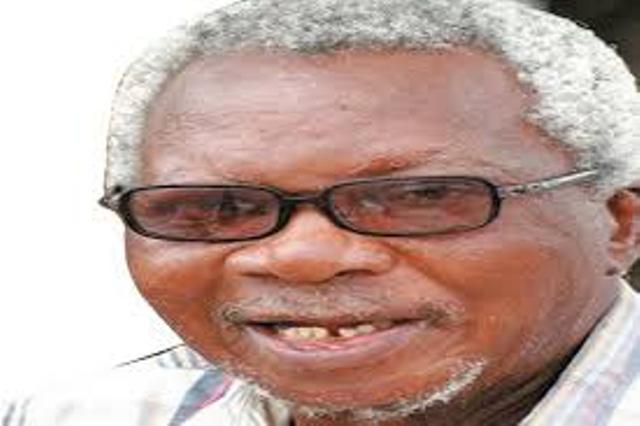Chukwuma Ajakah
Africa’s literary legend, Professor Emeritus, John Pepper Clark-Bekederemo (1935-2020), physically exited the stage on October 13, leaving volumes of miscellaneous works that cut across diverse genres, graphically portraying Nigeria as a geographical entity in a parlous condition.
The poem, “The Casualties” is about the most popular among the legendary writer’s protest writings. The Casualties explores the vagaries of the Nigerian civil war with emphasis on its devastation on both sides of the divide.
The poem, originally from the renowned scholar’s war memoirs, is one of the works that x-ray his lamentations on the state of affairs in Nigeria, earning him the nickname, “The Weeping Poet”.
Five decades after the civil war, Nigeria is still stuck in a rut. In fact, even those who were born years after the war have innocuously been enlisted as “casualties” whose fate hangs in the balance as a consequence of the imbroglio with the very soul of the country irredeemably set on the edge of a precipice.
The poet believes the real “casualties” are the survivors, ranging from the harbingers of the war, the political elite to innocuous victims who are inexorably caught in the ensuing inferno: “The casualties are not only those who started a fire and now cannot put it out. Thousands/ Are burning that had no say in the matter.”
According to the persona, the roll-call is an all-inclusive list: However, he exempts “those who are dead” from the list in the opening lines: “The casualties are not only those who are dead/ They are well out of it.”
The poet uses the imagery of ‘an unwanted guest’ as a metaphor of the dreaded epidemic that killed many infants, especially on the side of Biafra, during the horrendous war to suggest that besides the kwashiorkor pandemic, diverse forms of misfortune still plague the country irrespective of the social strata: We are all casualties/ All sagging as are/ The cases celebrated for kwashiorkor/ The unforeseen camp-follower of not just our war.”
Clark’s “The Casualties” is a protest poem set against the backdrop of the Nigeria-Biafra War (1967-1970) and first published in a collection titled “The Casualties: Poems 1966-68” on the stable of Africana Publishing Corporation USA (1970). The poem captures the vicissitudes of life in a civil war setting as epitomized in the Nigerian experience.
Over the years, “The Casualties” has prominently featured in several anthologies, academic journals and poetry magazines, including A Selection of African Poetry annotated by K.E. Senanu and T. Vincent (1976) which was widely read as a prescribed text in the 80s and 90s for the West African School Certificate Examinations (WASCE).
The anthology also features Clark’s other lyrical and pastoral poems: Streamside Exchange, Night Rain, Song and Fulani Cattle whose subject matters and embedded themes have remained relevant in contemporary Nigerian society.
In J.P. Clark-Bekederemo’s (2002) The Poems (1958-1998), “The Casualties (to Chinua Achebe)” appears together with a series of other protest poems on the Nigeria-Biafra War such as The Cockerel in the Tale, Vulture’s Choice, The Burden in Boxes, Dirge, The Usurpation, Seasons of Omens, The Reign of the Crocodile, Leader of the Hunt, What the Squirrel Said, Return Home, Night Song, Benin Sacrifice, A Photograph in the Observer, Friends, Death of a Weaverbird, The Beast, Aburi and After, The Rat in a Hole, August Afternoon, Exodus, The Locust Hunt, July Wake, Conversations at Accra and Epilogue to Casualties (to Michael Echuero).
Each of these poems reveals the iconic poet’s unbiased attitude to the war and his unbridled patriotic commitment to the realization of a value driven egalitarian society where every life counts. The Casualties is crafted into three stanzas and 45 lines, prosaically detailing the poet persona’s vicarious experiences and perceptions about the civil war. The poem appeals to the reader’s sense of reasoning as it represents a clarion call for a change of attitude and genuine commitment to resolution of conflicts.
The themes embedded in “The Casualties” include ‘Futility of war’, ‘Self-inflicted Suffering’, ‘War as a Leveler’, ‘Social Inequality’, ‘Collective Misfortune’, ‘Consequences of War’ and ‘Inevitability of Change’. Most of the themes are succinctly mirrored in the following lines excerpted from the last two stanzas: The casualties are many, and a good number well/Outside the scenes of ravage and wreck/ They are the emissaries of rift/ So smug in smoke-rooms they haunt abroad/ They do not see the funeral piles/ At home eating up the forests/ They are the wandering minstrels who, beating on/The drums of the human heart, draws the world into a dance with rites it does not know/ The drums overwhelm the guns…We fall/All casualties of the war/ Because we cannot hear each other speak/ Because eyes have ceased to see the face from the crowd…/We are characters now other than before/ The war began, the stay-at-home unsettled/ By taxes and rumours, the looters for office/ And wares, fearful every day the owners may return/ We are all casualties…”
The poetic devices Clark employs in expressing his message in this poem include repetition, which is particularly deployed to achieve emphasis, rhyme and rhythm as instantiated in the recurrent use of the expression: “The casualties are not only those who…” in lines 1, 3, 5, 9, 12 and 15.
The poet also makes elaborate use of imagery and musical devices as in: “Wandering minstrels beating on the drums of the human heart” figurative language exemplified in the use of metaphors, such as “The drums overwhelm the guns..”, euphemism, “…Those led away by night/Nowhere as absolute as the grave”, personification, “Kwashiorkor, the unforeseen camp-follower of not just our war”, irony “Those who started a fire/And now cannot put it out”, hyperbole “The drums of human heart, draw the world into a dance/…those who escaping the shattered shell become prisoners in/ A fortress of falling walls”, paradox “The cell is a cruel place, sometimes a haven” and litotes “…whether we know or/ Do not know the extent of wrong on all sides…”
The endless list of “casualties” cuts across all strata of the society: “those who have lost persons or property”, “those led away by night”, “those who escaping the shattered shell become prisoners…”, “the emissaries of rift”, “the wandering minstrels who …draw the world into a dance with rites it does not know,” et cetera.
The tension ignited through the overriding tone of mourning is temporarily doused with euphemistic expressions such as: “Nowhere as absolute as the grave” and “They are well out of it.” Similarly, the use of litotes as typified in the following negative expressions, reveals a dominance of pessimism in the poet’s mood: “The casualties are not only those who started a fire and now cannot put it out/ Thousands/ Are burning that had no say in the matter.”
As the grandmaster bows out of the centre stage of poetry after actively dominating it for more than half a century, he is “well out of” of the endless list of the “casualties”, but his fears for Nigeria, couched in the immortal lyrics of his sundry works may assume a more frightening dimension in the lives of those who are left “to grope for a touch” of socio-political and economic realities that may forever be elusive.
Worse still, a good number of those who start a “fire that they cannot put out” disparages the sage’s wisdom and appears bent on igniting another “fire” with their “emissaries of rift” beating the drums that may again “draw the world into a dance with rites it does not know.”




























































